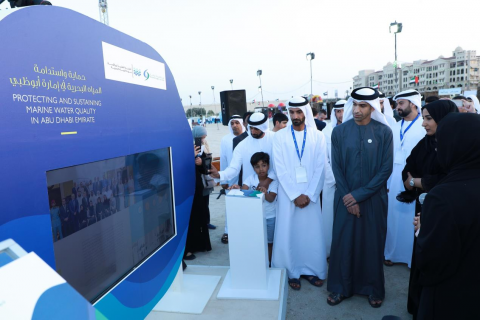
The Environment Agency – Abu Dhabi (EAD) has launched ‘The Reservation and Sustainability of Marine Water in Abu Dhabi’, a book that documents the achievements of the Higher Committee for Enhancing Marine Water Quality and its technical team from 2012 to 2018. The book, which outlines the team’s marine water protection and sustainability efforts in Abu Dhabi and its key projects and initiatives, was launched as part of Abu Dhabi Blue Week.
His Excellency Dr. Thani Al Zeyoudi, UAE Minister of Climate Change and Environment launched the Digital Book in the presence of Her Excellency Dr. Shaikha Salem Al Dhaheri, Acting General Secretary of the Environment Agency – Abu Dhabi, HE Ahmad Saqr Al Suwaidi CEO ADNOC Offshore, and Saif Rashed Al Muhairi, President Maritime Sector in Department of Transport - Abu Dhabi (DoT).
The book is the result of a collaboration between member entities of the committee and EAD’s technical team. Several students from Zayed University also participated in compiling the publication, enabling them to enhance their knowledge and capabilities, and gain valuable experience that they can apply in their future careers.
Commenting on the occasion, Her Excellency Dr. Shaikha Salem Al Dhaheri, Acting General Secretary of the Environment Agency – Abu Dhabi, said: “The formation of the committee in 2012 under the chairmanship of EAD and with the membership of all stakeholders concerned with the quality of marine water, came in response to the challenges facing the marine environment in the emirate. Furthermore, it reflected EAD’s belief in the importance of preserving the quality of marine water for sustainable coastal development. The committee prepared a plan to stop harmful discharges to the marine environment, establish a unified legislative and regulatory framework for the marine environment, and address the emergencies that may affect marine waters.”
In his foreword to the publication, His Excellency Mohammed bin Ahmad Al Bawardi, Minister of State for Defence Affairs, Vice Chairman of EAD and Head of the Higher Committee for Enhancing Marine Water Quality, said: “Abu Dhabi has assigned a special priority to improving marine water quality, since marine water is the main source of desalinated fresh water, and waterways and ports are instrumental in boosting the national economy and trade with the region and the world.”

He added: “Plan Abu Dhabi 2030, announced by the Abu Dhabi government, includes a special programme focusing on marine water quality, and mandates EAD to coordinate with other stakeholders to execute projects and initiatives as part of this programme.”
Highlighting the contribution of EAD, His Excellency Mohammed bin Ahmad Al Bawardi said: “EAD, the government entity responsible for protecting Abu Dhabi’s environment, has led the drive to improve marine water quality in line with the UAE Marine Water Quality Index, as defined by the Government of Abu Dhabi, in cooperation with other government entities that are members of the committee. The drive is part of Plan Abu Dhabi 2030’s objectives to enhance the environmental sustainability of the emirate and preserve its natural heritage.”
He added: “The efforts of the Government of Abu Dhabi over the past few years have certainly helped improve marine water quality in the emirate. This in turn, has reflected positively on the sustainability of the marine environment that plays an important role in supporting economic and tourism activities and has a significant impact on public health and natural resources.”
For her part, Her Excellency Razan Khalifa Al Mubarak, Managing Director of EAD, said: “We attribute the encouraging results to the effective cooperation between the members of the Higher Committee for Enhancing Marine Water Quality and the invaluable support of other relevant entities.”
She added: “Since its inception, the committee has implemented multiple projects, programmes and initiatives. It also launched awareness campaigns targeting different segments of society as well as public and private sector institutions. These endeavours have helped create a better understanding of the factors that have a negative effect on marine water quality as well as the measures that result in its tangible improvement.”
Her Excellency Razan Khalifa Al Mubarak noted that this book tells a success story that culminated in the technical team winning the gold award in the work teams category of EAD’s Al Dana internal excellence programme in 2016.
The book summarises the most important achievements of the committee and the key projects and programmes implemented within the plan. Furthermore, it outlines the committee’s role in boosting the quality of marine water and developing integrated work mechanisms for its member entities, particularly in terms of licensing and enforcement procedures, emergency response and infrastructure projects.
Highlights of the book:
- Conducting a comprehensive legislative and operational gap analysis and developing a legislative and regulatory framework necessary to reduce damage to the marine environment. For example, the committee prepared the executive regulations on marine water quality, including the quality standards for water and the surrounding marine sediments, and technical standards for liquid discharges from land-based sources to the marine environment. Executive regulations concerning the management of waterways were also drawn up.
- Strengthening marine water control programmes through several measures, including the use of automatic buoys for real-time monitoring with a unified database across all entities, which assisted decision makers in developing future plans.
- Following up on several infrastructure projects, including the Abu Dhabi Strategic Tunnel Enhancement Programme, as well as the construction and expansion of wastewater treatment plants, such as the Ruwais Wastewater Treatment Plant.
- Integrating the efforts of government entities and the academic sector through initiatives such as proposing an institutional framework for environmental health in the emirate that covers governance, research and operations, in addition to developing a unified database and early warning system for marine water quality.
Categories
- Log in to post comments